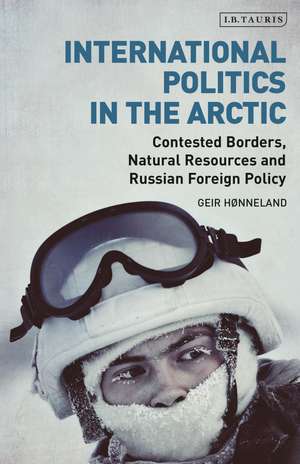International Politics in the Arctic: Contested Borders, Natural Resources and Russian Foreign Policy: Library of Arctic Studies
Autor Geir Hønnelanden Limba Engleză Paperback – 25 dec 2019
| Toate formatele și edițiile | Preț | Express |
|---|---|---|
| Paperback (1) | 233.46 lei 43-57 zile | |
| Bloomsbury Publishing – 25 dec 2019 | 233.46 lei 43-57 zile | |
| Hardback (1) | 717.79 lei 43-57 zile | |
| Bloomsbury Publishing – 2 oct 2017 | 717.79 lei 43-57 zile |
Preț: 233.46 lei
Preț vechi: 298.46 lei
-22% Nou
Puncte Express: 350
Preț estimativ în valută:
44.67€ • 46.76$ • 37.18£
44.67€ • 46.76$ • 37.18£
Carte tipărită la comandă
Livrare economică 31 martie-14 aprilie
Preluare comenzi: 021 569.72.76
Specificații
ISBN-13: 9780755601110
ISBN-10: 0755601114
Pagini: 416
Ilustrații: 2 maps
Dimensiuni: 138 x 216 x 29 mm
Greutate: 0.48 kg
Editura: Bloomsbury Publishing
Colecția I.B.Tauris
Seria Library of Arctic Studies
Locul publicării:London, United Kingdom
ISBN-10: 0755601114
Pagini: 416
Ilustrații: 2 maps
Dimensiuni: 138 x 216 x 29 mm
Greutate: 0.48 kg
Editura: Bloomsbury Publishing
Colecția I.B.Tauris
Seria Library of Arctic Studies
Locul publicării:London, United Kingdom
Notă biografică
Geir Honneland is Research Director at the Fridtjof Nansen Institute and Adjunct Professor of Political Science at the Arctic University in Norway. He has published widely in Norwegian and in English on territory disputes and environmental factors in the Polar North. He gained his PhD from the University of Oslo in 2000 and is one of the most respected commentators in the field of Arctic Studies.
Cuprins
Part I BackgroundIntroduction1. Identity Formation in the Barents Euro-Arctic Region Introduction: The Creation of the Barents Region The Region-building Approach Self and Other in Identity Formation Alleged We-hood: The Return from a Historical Parenthesis The Fragility of We-hood 'The Cultural Counter-argument' 'The Identity of Contrasts' Conclusion Part II Environmental Discourse in the European Arctic2. Fish Discourse: Norway, Russia and the NortheastArctic Cod Introduction The Concept of Discourse Analysis 28The Study of Environmental Discourse 30Scientific Recommendations and EstablishedQuotas Since 1990 33Defining Major Discourses 34Conclusion 453. East Meets West: Deliberations on the Environment 48Introduction 48The Study of Environmental Discourse 49Environmental Issues in the European Arctic 51Defining Major Discourses 53Brokering Scientific Knowledge 63Storylines and Metaphors 65Embeddedness and Discourse Classification 66Conclusion 69Part III Implementing International EnvironmentalAgreements in the Russian North4. From Air Pollution Control to Nuclear Safety:Why Implement? 75Introduction 75Implementation: The 'What's, 'Why's and 'How's 76What's the Problem? 80What's to be Implemented? 83Implementation Performance and Target Compliance 86Implementation Activities 87Discussion 93Conclusion 995. Implementing Global Nature Protection Agreements 102Introduction 102The Global Nature Protection Regimes 104Implementation of the Agreements in Russia 106Domestic Implementation Activities 113Conclusion 122Part IV Combating Communicable Diseases inNorthwest Russia6. Western vs Post-Soviet Medicine: Donors andDilettantes 127Introduction 127DOTS in Russia and the Baltic states 129General Receptiveness to Western Ideas 139Conclusion 146vi INTERNATIONAL POLITICS IN THE ARCTIC7. Patriots, Doctors and Happy Soviets 149Introduction 149Interpreting Qualitative Interviews 150Health Initiatives from the West 152The Interview Scene: 'Cast' and Interpretation 153Part V Russians in the Borderlands8. How to be a Northerner 165Borderlands, Identity, Narrative 165Interview 1: 'When I told them how I lived,they went all misty-eyed' 169Interview 2: 'If you'd asked me last year, I would have saidMurmansk was the best place in the world' 172Interview 3: 'The north is like a bottomless pitdragging you down' 174Negotiating Stereotypes about North and South 176The Vocabulary Available - Identity as Narrative 181Changing Borders? 185Conclusions 1879. How to be a Russian 190Introduction 190Interview 1: 'Their eyes are always wide open' 190Interview 2: 'As nations, they're on the decline' 191Interview 3: 'Everything over there predisposesthem to equanimity' 192Exploring Stereotypes about Scandinavians 193The Words to Say It - Identity as Narrative 201New Borderlands? 204Narrative Juggling 209Part VI Post-Agreement Bargaining in the Barents Sea10. Making Russia Comply: Bargaining PrecautionaryFisheries Management in the Barents Sea 215Introduction 215Approaches to State Compliance with International Treaties 217Post-agreement Bargaining 219CONTENTS viiThe Norwegian - Russian Fisheries Management Regimein the Barents Sea 222Norwegian - Russian Bargaining Experiences 225Why does Russia Comply? 229Post-agreement Bargaining Revisited 23511. Fishing Field Deliberations 237An Observer's Account 238Russian Fishers' Accounts in the late 1990s 246Russian Fishers' Accounts Ten Years Later 250Bargaining Dynamics 254Bargaining Results 258Post-agreement Bargaining Revisited 262Part VII Arctic Talk, Russian Politics12. 'The Global Fight against Canada in the Arctic' 267Identity and Foreign Policy 267All the Way to the Pole 270'The Global Fight' 274'The Arctic is our Everything' 281Our Ocean, Our Future, Our Foes 28513. 'They'll Squeeze us Out, it'
Recenzii
The book is an unarguably necessary read for any political scientist interested in how andwhy Russia operates in the Arctic.




